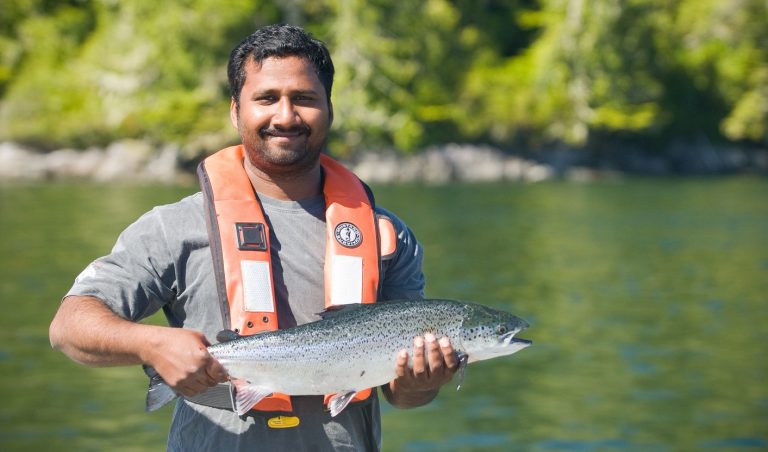
Welcome to summer! Our June newsletter talks about seaweed farming; one topic you will delve into in the Graduate Certificate in Aquaculture program. Also, aquaculture in British Columbia has been in the news recently, including decisions from Fisheries and Oceans Canada on salmon farming in the Discovery Islands and a recent publication on salmon viruses. You can read about these events below in News and Views.
If you have any questions about UBC’s certificate program, please visit the website or send an email to lfs.aquaculture@ubc.ca.
Yours aquaculturally,
Justin Henry
Business Development Director
UBC Graduate Certificate in Aquaculture
Certificate Updates
UBC’s Graduate Certificate in Aquaculture program is accepting applications for the fall 2021 term until July 31. Note that the program will be a hybrid model again this year, with classes on-line combined with in-person field trips.
You can read more about the program on our website, and in this article in Aquaculture North America.
News and Views
We start out this issue with an article from Euronews entitled “What is aquaculture and can it prevent overfishing?” The article contains links to seafood consumption data as well as collapsing wild fishery data.
Seaweed and kelp have been popular in the news over the past month. Here are three selected links covering things for the consumer to know about seaweed, kelp farming in North America and, for lots of seaweed information, the Canadian Seaweed Symposium issue of the Bulletin of the Aquaculture Association of Canada (2018).
- Four things to know about seaweed, from Canadian Grocer
- Kelp is the climate-friendly crop, from Global Aquaculture Alliance
- Canadian Seaweed Symposium, from Aquaculture Association of Canada
Salmon farming in B.C.’s Discovery Islands has been in the news. One of B.C.’s largest aquaculture producers, Cermaq Canada, recently had their application to transfer salmon smolts to their farms in the Discovery Islands denied by Fisheries and Oceans Canada (DFO). This was due in part to DFO’s plans to wind down aquaculture in the Discovery Islands region by 2022.
Earlier, DFO led research in the Discovery Islands area and concluded Atlantic salmon farms pose no more than a minimal risk to Fraser River Sockeye salmon abundance and diversity under current fish health management practices. This was based on input from expert reviewers, and peer meetings with scientists, members of DFO, First Nations, and environmental organizations. However, DFO still plans to wind down open net farms in the region. Read the DFO report here.
A recent report from UBC stated that that Piscine orthoreovirus (PRV) was introduced to B.C. by farmed salmon from Norway. However, PRV was present in B.C. in 1977 (just re-sequenced last year by DFO), before salmon farming took hold in the province. Also, peer-reviewed studies indicate the strain of PRV found in B.C. does not cause disease, or harm, to salmon.
Articles on PRV and salmon health:
- PRV was in Canada before salmon farming, says fish vet
- UBC salmon virus study challenged by global experts
- High-Load Reovirus Infections Do Not Imply Physiological Impairment in Salmon
- Piscine orthoreovirus demonstrates high infectivity but low virulence in Atlantic salmon of Pacific Canada
Enjoy the beginning of summer!